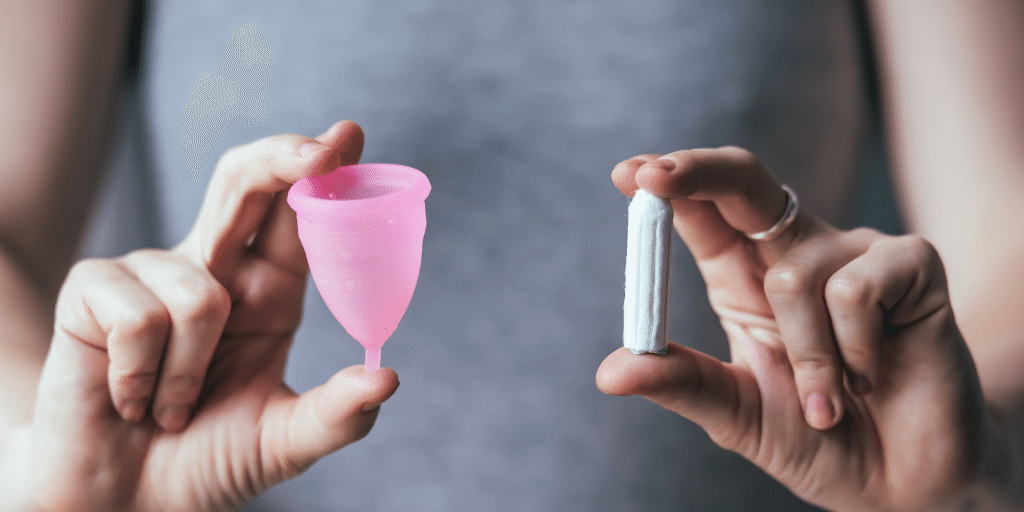Sign up to our newsletter!
How To Delay Your Menstrual Period
Are you looking to postpone or delay your menstrual period? Stopping or delaying your menstrual flow for a few weeks or months would not make you sick or unwell in any way. Here are practical ways you can do so.
 You can delay your menstrual flow for a few weeks or the whole year and give your tampons or diva cup a rest.
You can delay your menstrual flow for a few weeks or the whole year and give your tampons or diva cup a rest.Although your menstrual period typically begins every 28 days, it is possible to suppress the hormonal cycle that brings it about, to delay, skip, or stop your menses.
Menstrual periods are not necessary for a good health or your physical function as such, though a prolonged postponement of your period for several months or years could lead to loss of your bone strength.
There are many reasons you may want to prevent your monthly period, including if you have:
- Abnormally heavy bleeding
- Painful cramping with each periods
- Severe mood swings
- Bloating, headaches, or a condition like endometriosis that is exacerbated by the menstrual cycle
- Disabilities that prevents you from maintaining adequate hygiene during the monthly period
- To avoid the inconvenience of a menstruation that coincides with an important event in your life, such as a vacation, camping, wedding, or an athletic or sporting occasion.
The following are sure ways to postpone or delay your period. We would discuss their pros and cons, which you can further explore with your own doctor.
Use Of Progesterone Only Pill, If You Are Not Already On A Birth Control Pill
 The pill norethisterone is commonly used to delay or prevent menstruation.
The pill norethisterone is commonly used to delay or prevent menstruation.As you know, there are two main female hormones - estrogen and progesterone.
Estrogen is what makes the lining of your womb grow thick, while progesterone is what makes the lining shed its blood and become thin. These two hormones have been likened to the fertilizer (estrogen) that you place on your lawn (the lining of your womb) to make it grow, and your lawn mower (progesterone).
Progesterone only pills are birth control pill that contains only progesterone.
They are very commonly used to delay or prevent onset of menstruation if you are not already on any form of birth control pill.
- They work by artificially increasing your progesterone levels at a time in the cycle when your progesterone levels naturally decline, prompting the body to shed the uterine lining and therefore you will have no bleed.
- Please note that if you are already on a combined contraceptive pill or even a mini-pill (progesterone only pill), you cannot use this to delay your period. And taking a mini-pill back-to-back would not also delay your period.
- An example of a commonly used progesterone only pill to delay menstruation include norethisterone or norethindrone. These are strictly speaking a progesterone-like pill.
- It is not all types of mini-pills that will help delay your period.
If your doctor is willing to prescribe norethindrone or norethisterone to delay your period, it is usually taken at a dose of 5 mg tablet, three times a day for about 21 days. Start taking it three days before you expect the menstrual period you are seeking to delay and continue until you are ready to have your period again. You will typically start bleeding two to three days after you stop taking this pill.
So make sure you time when you start taking this to correspond with when you do not want your period.
This pill is not advised in women with a history of:
- Blood clot or venous thromboembolic disease, including deep vein thrombosis (DVT) and pulmonary embolism (PE.)
- Hormone sensitive malignant tumors.
Other progestin-only methods of suppressing menstrual bleeding include depot medroxyprogesterone acetate, which is administered as an intramuscular injection every three months, or the progesterone- only IUD.
Even with use of progestin-only methods, 80% of women will have breakthrough bleeding or irregular periods long term.
Use Of The Combined Birth Control Pill, Back to Back
 You can also use your combined contraceptive pills or regular birth control pill with two hormones to prevent or delay your period.
You can also use your combined contraceptive pills or regular birth control pill with two hormones to prevent or delay your period.Oral contraceptive pills that contain both estrogen and progesterone are known as combined oral contraceptives.
Pills that come in a pack of 21 pills all contain active hormones.
In packs of 28, the final seven pills are inactive and used as a spacer.
In either case, after you stop taking active pills on day 22, you will experience withdrawal bleeding in response to decreased hormone levels.
If you continue to take active pills by starting a new pack of 21 on the day after you complete your packet or if you skip the inactive pills in a 28 day pack and begin a new pack immediately, you will not experience the withdrawal bleeding that mimics the menstrual period.
If you would like to use combination oral contraceptive pills to prevent onset of your menstrual period, you should ask your doctor about this, since each combined contraceptive pill has a unique combination of estrogen and progesterone.
Most experts recommend limiting use of this method to 2-3 months.
- Start using your regular combined pill one month before your planned time to be menstrual period-free
- Continue through the time you would have expected your period and
- Take two packets back to back without a break.
- You would resume your normal period at the completion of the second packet.
If you would like to avoid a menstrual period for a longer time, say for 6 to 12 months, your doctor may prescribe one of the monophasic or continuous or extended-cycle birth control pills. These combination pills contain ethinyl estradiol and levonorgestrel and they are prescribed for longer periods of time to delay or suppress the menstrual period.
Use of continuous or extended-cycle contraceptive pills is associated with no greater risk than use of cyclic pills that result in monthly bleeding.
In fact, benefits include:
- reduced risk of ovarian and endometrial cancer;
- prevention of severe migraine headaches associated with the menstrual period in some women;
- prevention of excessive blood loss in women with anemia;
- prevention of heavy bleeding associated with uterine fibroids;
- prevention of premenstrual syndrome;
- and prevention of dysmenorrhea, which refers to painful uterine bleeding.
Brand names include:
- Seasonale
- Lybrel
- Seasonique, and
- Quartette and their generic versions.
Seasonale is prescribed for thirteen weeks, but the thirteenth week of the prescription contains inactive pills. This results in a menstrual cycle approximately every three months. Seasonique is prescribed for 13 weeks.
The pills prescribed during the initial twelve weeks contain progesterone and estrogen and the final week contains a small dose of estrogen only. During the final week, withdrawal bleeding occurs but low dose estrogen may prevent some of the unpleasant symptoms associated with the menstrual period, including bloating and heavy bleeding.
Quartette contains a gradually increasing dosage of estrogen in addition to a constant dose of progesterone and prescribed for a 91-day period. With this pill, you will have a period every three months and the increasing dosage of estrogen may reduce breakthrough bleeding.
Lybrel is a different combination pill that contains low doses of both estrogen and progesterone. It is prescribed for a year, taken continuously.
Breakthrough bleeding may decrease with continued usage.
You should not use combination oral contraceptive pills, if you have
- Coronary artery disease,
- Diabetes mellitus with vascular disease,
- Inherited or acquired disorders that cause blood clotting,
- Migraine headaches associated with vision problem or aura
- Uncontrolled hypertension.
- History of smoking and are obese and or older than 35 years of age with any of these conditions.
Smoking not only increases the risk of breakthrough bleeding, it also increases cardiovascular risk, including stroke and heart attack. Cardiovascular risk is further heightened in women over the age of 35 who smoke.
Combined Contraceptive Patch And Rings
 Are you already using a combined contraceptive patch for birth control? You can use the patch back to back for 6 weeks to delay your period.
Are you already using a combined contraceptive patch for birth control? You can use the patch back to back for 6 weeks to delay your period.If you prefer, other options for use of combined contraceptive treatments include transdermal patches and transvaginal “vaginal ring” contraceptives, although neither of these methods are as effective.
This is especially if you are already using contraceptive patches or nuvaring for birth control.
The patch can be put on for 6 weeks straight without a patch-free period. You should resume your normal menstrual period at the end of the sixth week.
How To Delay Your Menstrual Period Using Anti-Inflammatory Pills

This is not a recommended way to stop your period.
Anti-inflammatory pills like ibuprofen, naproxen, ketorolac or diclofenac at a high dose can stop your menstrual period.
It is usually not recommended because the dose that will help stop your period is almost certain to cause irritation to your stomach and even make you bleed internally.
A dose of ibuprofen at about 800 mg taken four times a day has been reported by the Cleveland Clinic to stop menstrual period.
The Best Way To Stop Your Period
To know more on how to delay your menstrual period for your particular medical situation and history, it is best to speak with your doctor or reach out to us online here.
Stay Connected







New! Comments
Have your say about what you just read! Leave me a comment in the box below.